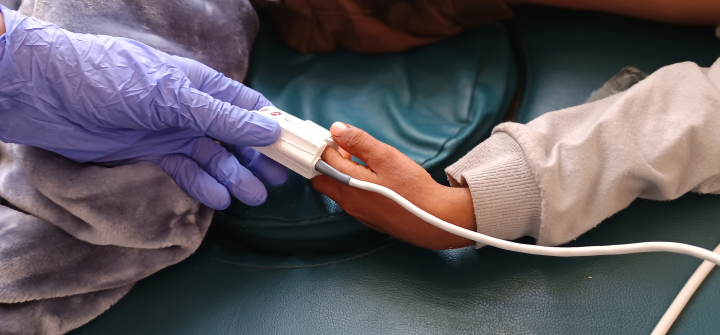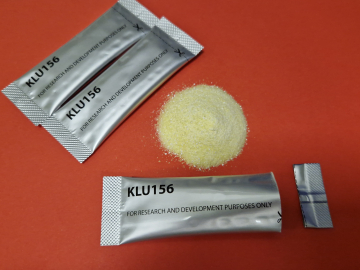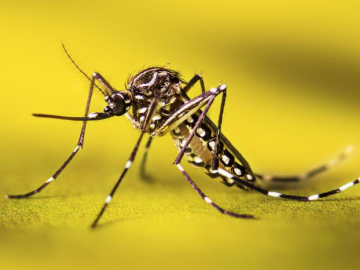Aid Cuts Hit Yemen Amid Measles Crisis
Even before the escalation of conflict over a decade ago, only about half of Yemenʼs population had access to health care services, and many health facilities lacked essential equipment and supplies.
In that time, challenges have grown. Vaccine-preventable diseases, including measles, have risen sharply, mainly because of gaps in routine vaccination and limited access to basic health care, while malnutrition and food insecurity have increased steadily each year. Meanwhile, U.S. aid cuts have gutted the countryʼs primary source of aid. “The detrimental impact [of the cuts] cannot be overstated,” Marisa Lister, a Médecins Sans Frontières medical coordinator based in Sanaa, told GHN.
Lister spoke with GHN via email this past summer about the countryʼs escalating measles outbreak, how lifesaving clinical care canʼt make up for gaps in vaccination coverage, and the repercussions of U.S. aid cuts on MSF, which supports Yemenʼs Ministry of Health in delivering vaccinations, along with Gavi, The Vaccine Alliance, and UNICEF.
How serious is the measles outbreak in Yemen?
MSF has treated over 12,200 cases of measles since 2022. We have witnessed a 470% increase in measles cases presenting to our facilities in Yemen, having treated 1,077 cases in 2022 to 6,136 cases in 2024.
Between April and July 2025, the MSF team treated more than 1,400 measles patients in Dhamar at Al-Wahda Hospital and mobile clinics, with children under 5 making up more than 56% percent of patients.
MSFʼs projects in Yemen are mostly hospital-based, so the overwhelming scope of the measles outbreak cannot be appreciated by these figures alone, as we often do not capture people with mild-to-moderate cases, who may only be treated at the outpatient level—or may not be able to access community or primary health care at all.
What are the key factors driving the outbreak and other health system challenges?
More than ten years of conflict in the country has taken its toll on vaccination programs, the functionality of the health system—particularly primary care, which is essential for vaccination—and the general health status of the population.
The current health system cannot keep up with the vaccination rates required for measles protection in a population—as we generally need >95% of the population vaccinated against measles to achieve herd immunity in any given community. Among the measles cases we have treated in 2025, we have seen low vaccination coverage. For example, 93% of people with measles in Ad Dahi hospital, a rural facility in northwestern Yemen, and 85% of people with measles at Abs hospital this year were not vaccinated against the disease.
Another challenge is that over 70% of Yemenʼs population resides in rural areas. If vaccination is only accessible at secondary health care facilities, with community and outreach vaccination strategies not well integrated into the health system, we will continue to see the population struggling to achieve the required vaccination coverage—especially in a context where conflict, insecurity, and poverty impede people from easily accessing hospital-level immunization programs.
We also know that measles and malnutrition are interlinked, and the protracted measles outbreak will only further exacerbate the malnutrition crisis in the country. In Abs hospital this year, nearly half of all people treated for measles were classified as severely malnourished.
How do these challenges impact MSF’s work specifically?
Across our MSF facilities in Yemen, we see and treat vaccine preventable diseases daily, whether it is measles, diphtheria, pertussis, or tetanus.
Our humanitarian efforts have focused on lifesaving case management, but our facilities and resources are becoming overstretched. Without the scaling up of vaccination efforts, transmission will continue, as measles is one of the most contagious diseases: For every one person infected with measles, up to 10 others can become infected.
Case management alone cannot and will not stop an outbreak. Instead, the root causes—often inadequate vaccination coverage and poor water and sanitation—need to be tackled.
Is vaccine hesitancy also an issue?
Vaccine hesitancy is a contributing factor to low vaccination rates in Yemen, and it appears to be heightened during vaccination campaigns, which is why health information and communication strategies are so important. Despite hesitancy, we have been able to deploy vaccines. In the governorates where we operate, at two of our hospitals (Abs General Hospital and Al Qanawis Mother & Child Hospital), we were able to ensure that over 1,900 expecting mothers received immunization against tetanus, over 6,000 neonates received vaccination against polio and tuberculosis at birth, and more than 13,000 routine essential vaccination doses were administered to children following hospital discharge during 2024.
How have U.S. government cuts impacted these efforts in Yemen?
The U.S. funding cuts were felt here in Yemen almost immediately, and the detrimental impact cannot be overstated. The U.S. was the biggest humanitarian contributor to Yemen in 2024, accounting for over 50% of the country’s humanitarian response plan funding. In four governorates where MSF is working in northern Yemen, we are expecting nearly 300 health facilities to be impacted by the U.S. aid funding cuts (some of which are already observed), with 4,000,000 beneficiaries to be affected. The health, WASH, and protection clusters are particularly impacted.
Yemen, already among the countries with the highest burden of acute watery diarrhea (AWD)/cholera, is facing additional challenges. Due to reduced funding, support for cholera treatment centers will be scaled back, posing serious public health risks and leaving a huge gap.
Yemen experiences a very prominent peak illness season between July and October each year, whereby malnutrition and other transmissible diseases spike, and bed occupancy and hospitalization rates soar. We are incredibly worried that, given the timing of the U.S. and other funding cuts, the current humanitarian situation on the ground may get worse.
There is a clear and urgent need for additional and substantial support in terms of access to health care, infrastructure, including staffing, and general assistance to increase capacities of Yemeni health care system. MSF calls upon donors to immediately increase and step up assistance, which will help allow vulnerable populations at heightened risk from funding cuts to access health care.
Join the 50,000+ subscribers in 170+ countries who rely on Global Health NOW summaries and exclusive articles for the latest public health news. Sign up for our free weekday newsletter, and please share the link with friends and colleagues: https://www.globalhealthnow.org/subscribe.
A nurse records vital signs for a measles patient in the Médecins Sans Frontières isolation ward. at Al-Wahda hospital, Dhamar, Yemen. May 27, 2025. Mohammed Khawamel/MSF





